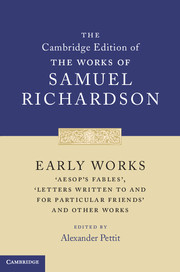Book contents
- Frontmatter
- Dedication
- Contents
- General Editors’ Preface
- Acknowledgements
- Chronology
- List of Abbreviations
- General Introduction
- Textual Introduction
- The Apprentice’s Vade Mecum (1733)
- A Seasonable Examination of the Pleas and Pretensions (1735)
- Preface to Aubin, A Collection of Entertaining Histories and Novels (1739)
- Aesop’s Fables (1739)
- Letters Written to and for Particular Friends (1741)
- Six Original Letters Upon Duelling (1765)
- Appendix: The Infidel Convicted (1731)
- Postscript
- Emendations
- Word-division
- Bibliographical Descriptions of Early Editions
- Explanatory Notes
- Index
Preface
Published online by Cambridge University Press: 30 June 2022
- Frontmatter
- Dedication
- Contents
- General Editors’ Preface
- Acknowledgements
- Chronology
- List of Abbreviations
- General Introduction
- Textual Introduction
- The Apprentice’s Vade Mecum (1733)
- A Seasonable Examination of the Pleas and Pretensions (1735)
- Preface to Aubin, A Collection of Entertaining Histories and Novels (1739)
- Aesop’s Fables (1739)
- Letters Written to and for Particular Friends (1741)
- Six Original Letters Upon Duelling (1765)
- Appendix: The Infidel Convicted (1731)
- Postscript
- Emendations
- Word-division
- Bibliographical Descriptions of Early Editions
- Explanatory Notes
- Index
Summary
The following Letters are publish’d at the Solicitation of particular Friends, who are of Opinion, that they will answer several good Ends, as they may not only direct the Forms requisite to be observed on the most important Occasions; but, what is more to the Purpose, by the Rules and Instructions contained in them, contribute to mend the Heart, and improve the Understanding.
NATURE, PROPRIETY OF CHARACTER, PLAIN SENSE, and GENERAL USE, have been the chief Objects of the Author's Attention in the penning of these Letters; and as he every-where aimed to write to the Judgment, rather than to the Imagination, he would chuse, that they should generally be found more useful than diverting: Tho’, where the Subjects require Strokes of Humour, and innocent Raillery: it will be seen, perhaps, that the Method he has taken, was the Effect of Choice, and not merely of Necessity.
The Writer is no Friend to long Prefaces; but it may be necessary, however, to say, what he has aimed at in this Performance; and to leave his Merit in the Execution of it, to proper Judges.
He has endeavour’d then, in general, throughout the great Variety of his Subjects, to inculcate the Principles of Virtue and Benevolence; to describe properly, and recommend strongly, the SOCIAL and RELATIVE DUTIES; and to place them in such practical Lights, that the Letters may serve for Rules to THINK and ACT by, as well as Forms to WRITE after.
Particularly, he has endeavoured to point out the Duty of a Servant, not a Slave; the Duty of a Master, not a Tyrant; that of the Parent, not as a Person morose and sour, and hard to be pleased; but mild, indulgent, kind, and such an one as would rather govern by Persuasion than Force.
He has endeavour’d to direct the young Man in the Choice of his Friends and Companions; to excite him to Diligence; to discourage Extravagance, Sottishness, and Vice of all Kinds.
He has aimed to set forth, in a Variety of Cases, to both Sexes, the Inconveniencies attending unsuitable Marriages; to expose the Folly of a litigious Spirit; to console the Unhappy; to comfort the Mourner: And many of these by Arguments, tho’ easy and familiar, yet new and uncommon.
- Type
- Chapter
- Information
- Early Works'Aesop's Fables', 'Letters Written to and for Particular Friends' and Other Works, pp. 324 - 325Publisher: Cambridge University PressPrint publication year: 2011

